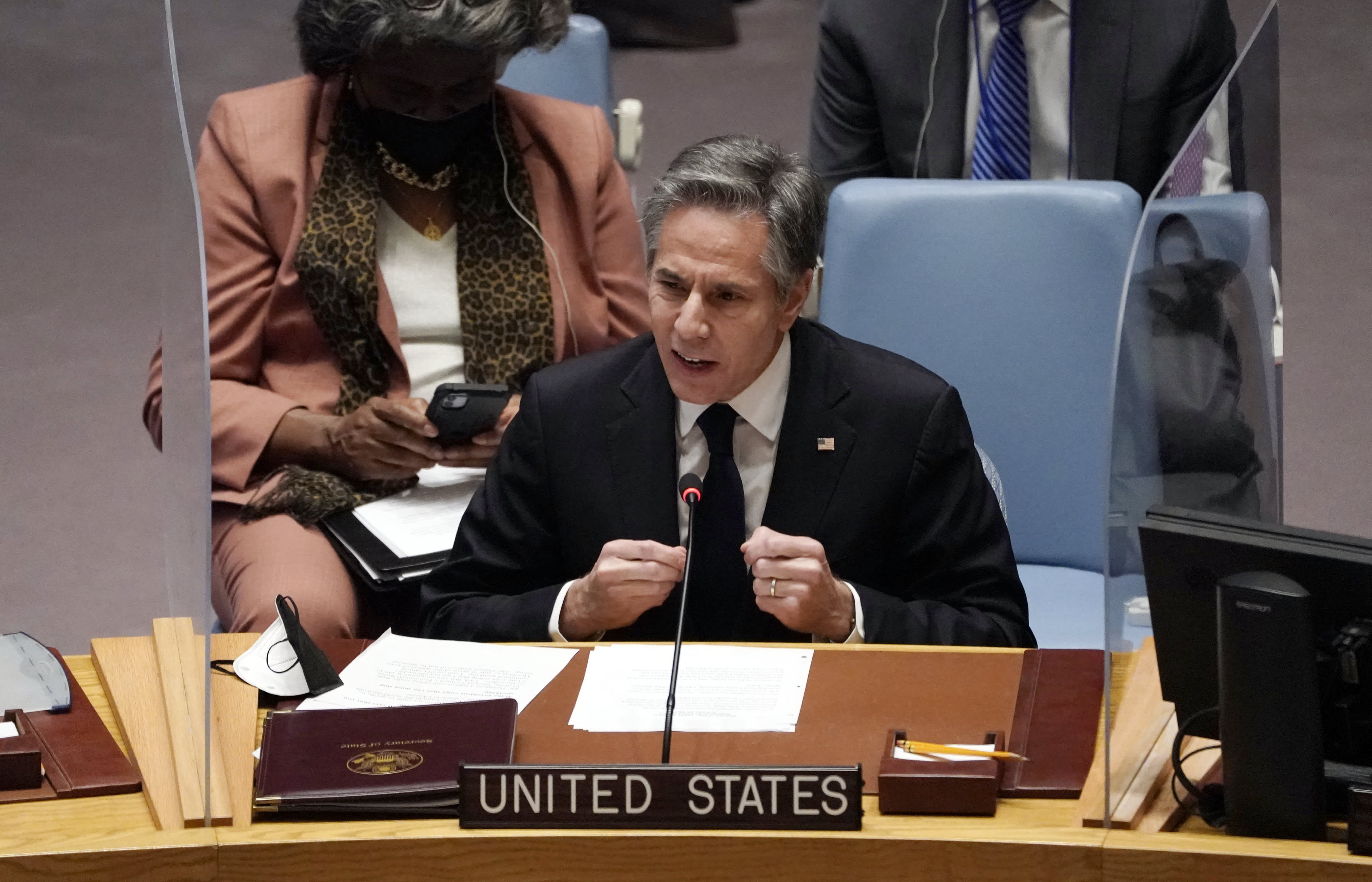
WASHINGTON – Secretary of State Antony Blinken, in a dramatic appearance at the United Nations, shared a grim assessment Thursday of what Russian forces could do to Ukraine if the Kremlin launched an invasion.
“We don’t know precisely how things will play out. But here’s what the world could expect to see unfold. In fact, it’s unfolding right now,” Blinken began in his address to the UN Security Council.
“Russian missiles and bombs will drop across Ukraine. Communications will be jammed, cyberattacks will shut down key Ukrainian institutions. After that, Russian tanks and soldiers will advance on key targets that have already been identified and mapped out in detailed plans. We believe these targets include Ukraine’s capital Kyiv, a city of 2.8 million people,” Blinken said.
Blinken, who embarked on a scheduled trip to Munich alongside Vice President Kamala Harris earlier on Thursday, flew instead to New York at the request of U.S. Ambassador to the United Nations Linda Thomas-Greenfield.
Thomas-Greenfield told reporters on a call Thursday morning that she requested Blinken to address the international forum because the drumbeat of war was sounding louder.
“Our goal is to convey the gravity of the situation. The evidence on the ground is that Russia is moving toward an imminent invasion. This is a crucial moment,” Thomas-Greenfield said on the call, adding that Blinken would “make it clear to the world that we are doing everything, everything we can to prevent a war.”
US Secretary of State Antony Blinken, with US Ambassador to the UN Linda Thomas-Greenfield (L), speaks at a UN Security Council meeting on Ukraine, on February 17, 2022, in New York.
Timothy A. Clary | AFP | Getty Images
The diplomatic developments unfolded as Ukraine accused pro-Russia separatists of attacking a village near the border.
Blinken called on Russia to de-escalate immediately, to cease aggression and choose to engage in dialogue and diplomacy.
“Let me be clear, I am here today not to start a war but to prevent one,” Blinken said, echoing a sentiment Secretary of Defense Lloyd Austin expressed earlier Thursday at the NATO headquarters in Brussels.
Austin, who wrapped up a two-day meeting with defense ministers, said that the U.S. and NATO allies still would prefer Russian President Vladimir Putin to pursue a diplomatic resolution to the crisis on Ukraine’s borders.
US Defence Secretary Lloyd Austin speaks during a press conference on the second day of a NATO Defence Ministers meeting at the NATO headquarters in Brussels, on February 17, 2022.
Kenzo Tribouillard | AFP | Getty Images
“Of course, one thing that Mr. Putin says he wants to do is to engage in more dialogue. As we have said all along, we would welcome that,” Austin began.
“As his deeds thus far tend to indicate, it will be clear to the entire world that we started a war with diplomatic options. It will be Mr. Putin who will bear the responsibility for the suffering and the immense sacrifice that ensues,” Austin said, calling on Putin to withdraw troops from Ukraine’s borders.
For months, the U.S. and its Western allies have watched a steady buildup of Kremlin forces along Ukraine’s border with Russia and Belarus. The increased military presence mimics Russia’s playbook ahead of its 2014 illegal annexation of Crimea, a peninsula on the Black Sea, which sparked international uproar and triggered sanctions against Moscow.
The Kremlin has denied that the extraordinary deployment of Russian troops outfitted with advanced military equipment along Ukraine’s borders is preparing for an invasion.
Earlier this week, President Joe Biden said the United States was prepared to defend NATO members as the crisis on Ukraine’s border with Russia intensifies.
“Make no mistake, the United States will defend every inch of NATO territory with the full force of American power. An attack against one NATO country is an attack against all of us,” Biden said, evoking the alliance’s collective defense rule known as Article 5.
“If Russia proceeds, we will rally the world,” Biden said Tuesday afternoon, adding that Washington’s allies were ready to impose powerful sanctions that will “undermine Russia’s ability to compete economically and strategically.”




